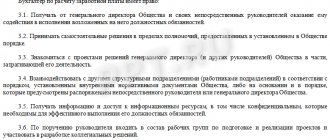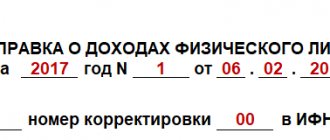Why do you need a job description?
The activity of any organization begins with determining its structure (division into divisions, departments, workshops, blocks and the distribution of functions between them).
In addition, divisions are assigned responsibility for resolving issues related to the range of their tasks. At the same time, some functions may be placed under the jurisdiction of not 1, but 2 or several divisions or, conversely, not be placed under anyone’s control. To eliminate duplication of functions and the absence of those responsible for their implementation, as well as to ensure an unambiguous distribution of responsibilities between departments, the current structure of the organization and the main functions of the departments are fixed in an internal administrative document. Then the goals, objectives, functions, structure and procedure for interaction with other divisions of the legal entity are prescribed in the regulations for each division. The goal of the head of the organization (or the person appointed by him) when approving these documents is to control the completeness of the reflection of the functions performed by the unit and to eliminate their duplication.
The regulations on the unit, giving an idea of the amount of work that this unit will have to perform, serves as the basis for determining its staffing levels, establishing the qualification level and positions of the required employees, distributing responsibilities between them and developing their job descriptions. Including, it provides material for the job description of the head of the department.
The obligation to develop regulations on departments and job descriptions is not fixed at the legislative level. However, they significantly facilitate the life of the organization itself, bringing clarity to the distribution of tasks between departments and employees within them, as well as defining the circle of those responsible for resolving certain issues.
A job description developed for a specific position allows you to:
- define specific functions for this position and simplify the procedure for familiarization with them;
- facilitate the selection of personnel for vacant positions;
- familiarize the employee with his functions against signature, thereby securing him responsibility for their failure to perform them and his right to refuse to perform someone else’s work without additional payment;
- monitor the performance of a specific employee and the correct distribution of functions.
Instructions for a number of positions may be standard, but it is better to develop them for each organization independently and individually, based on the specifics of the activities of a particular legal entity, the characteristics of its industry, structure and delimitation of areas of responsibility between divisions. This document is given legal force by its approval by the head of the organization.
Choosing a new field of activity: requirements, knowledge, responsibilities
Many are afraid to change their usual way of life and have been working for years in openly problematic enterprises. Of course, quitting your job and going into the void is not very wise, but you shouldn’t hesitate to make a decision. First, you should analyze your “assets”: useful work skills, education, abilities and inclinations.
- Education. A specialist with both secondary specialized and higher education can work as an accountant. For a professional with a university diploma, interesting and promising areas are open: financial analytics, audit, enterprise economics.
Don’t miss the opportunity to improve your skills at courses, seminars, and conferences. Additional education not only improves your professional level, but will also be useful for your future resume.
- Additional job responsibilities. In small companies, an accountant deals with several areas at once. Most often this involves working with personnel, financial planning, contacts with suppliers and clients. When looking for a job, these valuable skills can come in handy.
- Abilities, psychological characteristics. Sometimes people think about changing jobs not only because of a low salary and an inconvenient schedule. Purely personal reasons may be more significant: emotional burnout, inability to cope with workload and stress, disappointment in the profession. You shouldn’t ignore such “little things” and continue to pull the strap through force. Perhaps by changing the field of activity, it will be possible to resolve psychological problems.
- Tendencies and hobbies. If reports, statistical tables and circular letters are boring, you should listen to yourself and do something else. If you like teaching young colleagues, you can open a finance school (face-to-face or online); If you like tinkering with accounting programs, it’s worth getting additional education in the IT field.
The distinctive qualities of an accountant are diligence, high efficiency, clarity, and the ability to follow job descriptions. These properties are also useful in other areas of activity, so they are definitely worth mentioning in your resume.
Possible options for the role of the chief accountant
The Law “On Accounting” dated December 6, 2011 No. 402-FZ assigns organizations the obligation to maintain accounting. It is allowed that accounting can be carried out (Article 7):
- the leader himself;
- attracted individual or legal entity;
- full-time chief accountant or other official.
Since accounting requires special knowledge, the specifics of the activities of a particular legal entity and prompt response to events occurring in it, most often these functions are assigned to the organization’s own employee, who is hired as a chief accountant. Mandatory requirements for it are set out in paragraph 4 of Art. 7 of Law No. 402-FZ:
- presence of higher or secondary specialized education;
- work experience in the field of accounting for at least 3 years out of the last 5 if you have a specialized education, and if not, at least 5 years out of the last 7;
- no outstanding convictions for economic crimes.
However, these requirements are mandatory only for chief accountants:
- in open joint-stock companies (except for credit institutions);
- insurance organizations and non-state pension funds;
- joint stock investment funds;
- management companies of mutual investment funds;
- other economic entities whose securities are admitted to circulation at organized trading (except for credit organizations);
- management bodies of state extra-budgetary funds.
For chief accountants of other economic entities, the above requirements are not mandatory.
You can find out more about what requirements for the qualifications of the chief accountant the new professional standard “Accountant” requires in ConsultantPlus. Get trial access to the system for free and go to the document.
Depending on the size of the organization, the chief accountant can work:
- As the only accountant. In this case, all accounting responsibilities fall on him. In small organizations, he usually also performs the functions of the personnel department.
- As part of a small accounting department. The chief accountant not only organizes and controls the work of the accounting department, but also performs part of the accounting work himself, just like ordinary accountants.
- As part of a large accounting service, one of the responsibilities of which is a significant amount of additional reporting and explanations presented both to the legal entity’s own divisions and to external users (owners, management structures, banks, counterparties, Federal Tax Service). In this case, control over the correct execution of accounting operations by accounting employees, preparation of reports and responses to requests becomes dominant for the chief accountant.
- As part of the accounting department, some of the functions of which are transferred to other divisions. In this case, the determining tasks for the chief accountant will be organizing the timely receipt of information, monitoring its quality and linking data.
Thus, the functions of the chief accountant largely depend on many specific conditions of the organization of which he is an employee, and the scope of his responsibilities may vary. In this regard, they need to be clearly defined in the job description of the chief accountant.
Requirements for accountants
According to the new rules, an accountant must have at least a secondary professional economic education in a training program for mid-level specialists.
An alternative is non-core secondary vocational education. But in this case, the applicant will have to receive additional professional education under a professional retraining program.
No work experience is required to fill the position of accountant. But to fill positions with a category (accountant of the first and second categories), at least one year of experience in a position with a lower (previous) category is required.
The list of required skills for an accountant includes the following:
- ability to draw up (execute) primary accounting documents, including electronic documents;
- ability to carry out a comprehensive check of primary accounting documents;
- ability to use computer programs for accounting, information and reference systems, office equipment;
- the ability to ensure the safety of primary accounting documents before transferring them to the archive.
Main tasks of the chief accountant
Regardless of the size of the organization of which he is an employee, the chief accountant belongs to the category of managers. He must have certain knowledge and perform a number of functions required for the position. These requirements for him are given in the Qualification Directory of Positions of Managers, Specialists and Other Employees, approved by Decree of the Ministry of Labor of the Russian Federation dated August 21, 1998 No. 37, and the professional standard “Accountant” approved by Order of the Ministry of Labor of the Russian Federation dated December 22, 2014 No. 1061n.
The professional standard is mandatory only for accountants of state and municipal institutions and organizations with a state share of more than 50% (Clause 1, Article 4 of the Law “On Amendments to the Labor Code...” dated 05/02/2015 No. 122-FZ) from 07/01/2016. Other organizations may be guided by its requirements, but have the right not to use it.
The knowledge portion of these documents lists:
- legislation on accounting, including issues of organizing accounting, rules for its maintenance, reporting;
- tax law;
- civil, financial and economic legislation;
- labor law;
- codes of ethics for professional accountants and corporate governance;
- statistical and management accounting;
- specifics, technology, structure, strategy and prospects for the organization;
- audit rules;
- methods of financial analysis of economic activity;
- accounting and reference legal databases.
The main functions of the chief accountant are provided by the Qualification Directory:
- organizing optimal accounting, including document flow, accounting work and development of accounting policies;
Read about what you need to pay attention to when developing an accounting policy in the article “ Drawing up a statement of accounting policies in an organization .
- compliance of transactions recorded by accounting with the requirements of current legislation;
- compiling all types of required reporting and meeting deadlines for its submission;
- correct calculation of taxes, insurance premiums and other charges;
- timely transfer of all necessary payments;
- participation in the formation of tax policy and financial analysis of activities;
- methodological assistance to other employees of the organization in matters of accounting and financial analysis.
Note that the main function of the chief accountant in the professional standard is the preparation of reports (Article 3.2 of the Accountant standard), however, the labor actions related to this position include all those listed for the chief accountant in the Qualification Directory .
The serious role of the chief accountant in an enterprise also implies increased responsibility. Which one you can find out in ConsultantPlus by getting free trial access to the system.
Requirements for chief accountants
Chief accountants must now have either a higher education (core or non-core) or secondary vocational education (core or non-core).
If the education is non-core (for example, technical), the applicant will also have to obtain additional professional education. That is, undergo a professional retraining program for accountants.
If you have a higher education, the chief accountant must have at least five years of experience in accounting and financial work. If you have secondary vocational education, at least seven years of accounting and financial work.
The required skills of a chief accountant include the following:
- ability to develop methods of accounting and formulate accounting policies of the organization;
- ability to develop forms of primary accounting documents, accounting registers, reporting forms and draw up a document flow schedule;
- ability to plan volumes and timing of work during the reporting period for reporting purposes;
- ability to assess the materiality of information disclosed in accounting (financial) statements;
- ability to prepare accounting (financial) statements during reorganization or liquidation of a legal entity;
- ability to use computer programs for accounting, information and reference systems, office equipment.
In addition, the new professional standard establishes the obligation for chief accountants to regularly receive additional professional education. In other words, chief accountants are obliged to constantly improve their qualifications.
The volume of the advanced training program for chief accountants must be at least 120 hours over three consecutive calendar years. At the same time, annually the chief accountant is required to devote at least 20 hours to advanced training courses.
Problems of Ch. accountant of a small company (LLC, JSC)
Features of the work of a chief accountant in a small organization include:
- absolute interchangeability of accounting staff, the need to be able to do everything yourself;
- the possibility of reducing the volume of accounting work and reporting through the use of special regimes or the use of concessions provided by the SMP;
- little demand for accounting data for financial analysis purposes;
- no need for a large number of additional forms of internal reporting;
- lack of demand for audits;
- lack of close attention from inspection authorities, a relatively small number of requests for clarification.
History of the profession
The first accountants were known back in Ancient India - there they were mainly involved in accounting for agricultural activities and were called bookkeepers. Actually, the name of the profession “accountant” appeared in the 15th century with the light hand of Emperor Maximilian, at the same time the first book on accounting appeared - the treatise of the Italian Luca Pacioli “On Accounts and Records”, the first attempt to describe and streamline the functions of an accountant. In Russia, this specialty was introduced by decree of Peter the Great at the beginning of the 18th century.
Functions of the chief accountant of a large enterprise
The chief accountant of a large enterprise has practically no opportunity to do actual accounting. The priorities in his work are:
- organization of an accounting scheme that covers in its full diversity all aspects of the enterprise’s activities;
- organization of complex document flow;
- development of an accounting policy that is significantly more detailed and voluminous than in a small legal entity;
- distribution of accounting functions among accountants, organization of their precise work, interaction and interchangeability;
- control and linkage of data used for the preparation of all types of reporting, including internal and statistical;
- generating reports as fully as possible using all forms of existing reports and drawing up the necessary explanations;
- calculation of a larger number of taxes, some of which are usually irrelevant for a small organization;
- mandatory participation in financial analysis and calculation of forecast data;
Read about methods for analyzing a financial results statement in the article “Methods for analyzing a profit and loss statement .
- working with inspectors during audits;
- a large amount of work in order to respond to various types of requests relating to accounting and taxation issues.
Specialization of positions and responsibilities of an accountant
The work responsibilities of an accountant directly depend on the structure of the enterprise in which he works. For example, in a small company you will have to keep records of all objects. In a large company, accounting positions may be specialized. Typically, specializations are divided into categories of accounting objects:
- Salary, vacation pay and benefits. This specialization is also called “payroll accountant.” For example, the responsibilities of an accountant in an LLC include calculating wages for company personnel, calculating and paying taxes and payroll fees, preparing reports to the Federal Tax Service and funds, as well as calculating disability benefits, vacation pay and other types of payments.
- Fixed assets. The employee’s tasks for accounting for fixed assets include systematically calculating depreciation, recording the receipt and disposal of fixed assets in accounting, periodically conducting inventories, reconciliations and monitoring the actual availability of property. You will also have to prepare reports to the Federal Tax Service, Rosstat and other regulatory agencies.
- Cash register. The cashier's job includes receiving and issuing cash, as well as reporting on all cash flow transactions. It is important to familiarize the cashier with the Directive of the Central Bank of Russia No. 3210-U.
- Materials and warehouse. Accounting for warehouse operations and provision of material supplies to enterprises. The work includes not only the reflection in accounting of operations on the movement of raw materials, fuel and lubricants and other materials, but also systematic monitoring of the actual availability of assets. It is necessary to exclude facts of theft and shortages.
- Settlements with counterparties. The employee’s tasks include reflecting in accounting the services and work provided by third parties. The employee is required to conduct systematic reconciliations of mutual settlements with counterparties in order to eliminate delays. Responsibilities also include working with debtors to reduce the level of accounts payable and receivable in the enterprise.
- Bank operations. The rate is introduced in large institutions. The work consists of reflecting transactions on the company's current accounts. Preparation of payment orders for settlements with the budget and counterparties, as well as reflection of inflows and outflows from banking operations.
The position of chief accountant closes the list. This is the head of the financial service, who monitors the correct reflection of business transactions by subordinates, and is responsible for the preparation of financial and tax reports. But the accounting responsibilities of an accountant can be separated, for example, assigning a separate employee to prepare tax returns and calculations.
Contents of the job description
Despite the significant difference between the texts of job descriptions that can be created for the chief accountant in a particular organization, its content consists of the same sections.
They are usually formed in the following sequence:
- requirements for qualifications (education, experience, knowledge);
- determining the place in the structure of the organization, the procedure for interaction with other employees;
- job responsibilities of the chief accountant;
- rights;
- responsibility.
Reasons for introducing a professional standard
The education system that developed in the USSR did not provide for mass training of accountants for commercial organizations. There was no need for this. However, the rapid market reforms of the 90s created a widespread need not just for economists and planners, but also for accounting employees. As a result, people without specialized education and work experience became accountants. This led to serious accounting errors and even tax crimes. However, in the mid-2000s the situation improved and the market received a sufficient number of competent specialists. As a result, a need arose to standardize the requirements for positions, remove excess employees (mainly pre-retirement or retirement age) from the market and improve the qualifications of the remaining ones.
Job Description Form
There is no strictly established form of job description, therefore it is developed and executed in the manner that applies to the preparation of such documents in the organization itself.
An indispensable condition for the entry into force of a job description is its approval by the head of the legal entity. It becomes mandatory for the employee from the moment he familiarizes himself with it and signs it.
You will find a sample job description for a chief accountant on our website.
Introduction of professional standards.
As noted, at the beginning of 2021, government institutions, as well as other state and municipal institutions, had to implement action plans for the implementation of professional standards: to establish, in particular, whether the requirements of professional standards are mandatory for employees of their organization, including chief accountants , conduct an analysis of the professional qualities of employees for compliance with these requirements, and also draw up plans for employee training and additional professional education within the budget for the corresponding year. The Ministry of Labor reminded us of this back in 2021 (Letter dated 04/04/2016 No. 14-0/10/B-2253).
For chief accountants of government institutions, the qualification requirements established by the professional standard are recommendations. However, if the employer is interested in competent employees, he can apply professional standards when developing job descriptions, recruiting personnel, organizing training, certification, etc. Accordingly, he can include in the job description of the chief accountant the knowledge, skills and functions established by the standard, as well as qualification requirements.
After changes are made to the job description, new employees will need to be hired in accordance with these requirements.
Results
A job description is a fairly important document that defines the specific functions of an employee. Since the chief accountant is one of the serious figures in any organization, his job description should be given special attention.
Sources:
- Resolution of the Ministry of Labor of the Russian Federation dated August 21, 1998 No. 37
- Law “On Accounting” dated December 6, 2011 N 402-FZ
You can find more complete information on the topic in ConsultantPlus. Free trial access to the system for 2 days.
In-demand professions for accountants: learning new things
If you can become an economist, personnel officer or auditor on the basis of your previous economic education, then to obtain a new specialty in a field far from accounting, you will have to start your studies all over again. But the effort expended is justified many times over: wages increase, and the prospects for career growth are impressive.
Accounting experience and skills are in demand in the field of Internet marketing, IT analytics, and SMM management. These professions can be mastered remotely, and the labor market constantly requires new qualified personnel in these specialties.
To fire or not to fire?
Let us say right away that even if the employer is obliged to apply the professional standard for the chief accountant, but his qualifications do not meet the requirements of the standard, it is impossible to fire the chief accountant for this, since there is no such basis for dismissal as, for example, “inadequacy of qualifications.”
If before the employer began applying (either independently or by force of law) the professional standard, the chief accountant without a higher education was already working and, during the implementation of the standards, it was established that his qualifications do not meet the requirements of the standard, he can be fired only based on the results of certification. And this can only be done after the employer offers the employee to undergo advanced training, including it in the employee professional training plan.
At the same time, even if the employee refused to improve his qualifications, but has sufficient experience and knowledge in his position, then, on the recommendation of the certification commission, he can continue to remain in his position.
If, based on the results of the certification, it is established that the employee is not suitable for the position held due to insufficient qualifications, then he can be dismissed on the basis of clause 3 of part 1 of Art. 81 of the Labor Code of the Russian Federation (inconsistency of the employee with the position held or the work performed due to insufficient qualifications confirmed by certification results). Before dismissal, the employee should be offered a transfer to another job that matches his qualifications.
An employee’s compliance with the requirements of the professional standard can be established as a result of him passing, and with his consent, at the direction of the employer, an independent assessment of qualifications, which is carried out in independent assessment centers.
Do not forget that dismissal under clause 3, part 1, art. 81 of the Labor Code of the Russian Federation may not apply to all workers. For example, a pregnant woman, a single mother raising a child under the age of 14 (a disabled child under the age of 18), and a woman with a child under the age of three are not subject to dismissal.
Law in accounting
Since the activities of an accountant entail administrative and even criminal liability, ignorance of the laws is simply unacceptable for the chief economist. First of all, you need a confident knowledge of tax legislation and a willingness to regularly monitor changes regarding taxes that economists most often encounter (value added tax and income tax). For this reason, a trend has emerged among the most forward-thinking accountants - obtaining a legal education in addition to the one already received in economics. The qualifications of a lawyer-economist allow you not only to be listed at the top of the organization, but also, if desired, to engage in business, personally monitoring your own business activities.
Sample resume for chief accountant
Resume for the position of chief accountantIvanova Lyudmila IvanovnaDate of birth: 05/10/1970 City: St. Petersburg Relationship status: Single Residence address: St. Petersburg, st. Zvezdnaya, 55, apt. 23 Mobile telephone Email: Employment: full time Work schedule: flexible schedule, full day Work experience: 25 years Desired salary: from 100,000 rubles. per month |
Education
1987-1992 — St. Petersburg University of Trade and Economics, St. Petersburg, Faculty of Economics, accounting, analysis and audit.
2010-2011 — Courses on working with specialized 1C programs and advanced training in the specialization “Audit”, LLC “Accountant”.
experience
1993-2000 - assistant accountant, St. Petersburg.
- Preparation and submission of accounting and tax reporting.
- Analysis of financial and economic activities.
- Maintaining personnel records.
- Interaction with counterparties and regulatory authorities.
- Reporting.
Achievements and experience:
- gaining experience working under the guidance of a chief accountant;
- participation in successful reporting.
2002-2010 - Financial Director, JSC Insurance, St. Petersburg.
- Drawing up budgets for income and expenses.
- Budgeting based on cash flow.
- Monitoring the execution of income and expense budgets and cash flows.
- Investing free funds.
- Tax planning and tax optimization.
- Accounting management.
- Preparation of responses to requests and instructions from the Bank of Russia.
- Maintaining accounting and tax records (OSN) in full for the founder’s company.
Achievements and experience:
- formation and submission of accounting, tax and supervisory reports for the insurance company as a whole;
- supervises more than 100 employees;
- reduction of the company's cost items;
- increasing profitability when investing financial investments.
2010 – present – chief accountant of Business-Stroy LLC, St. Petersburg.
- Maintaining accounting and tax records.
- Automation of the workflow of accounting employees (elimination of duplicative functions; manual functions).
- Cash flow management, organization of financing and distribution of available funds.
- Organizing annual inventories of assets and liabilities.
- Studying the legislative framework and implementing innovations.
- Conducting a comprehensive economic analysis of all types of enterprise activities.
- Passing audits. Preparation of financial statements for banks.
Achievements and experience:
- achieved a reduction in the standard reporting preparation time by 3 times - from 30 to 10 days due to measures that increase the efficiency of the accounting department, which made it possible to increase the period for consideration of reports by the owners;
- developed and implemented measures aimed at optimizing the budgeting system across 2 branches (regulations, instructions, training of responsible persons);
- successfully completed a project to automate the reflection of reserves for doubtful debts in the 1C accounting system, in accordance with PBU and the company’s accounting policies.
Professional quality
- Extensive experience in crisis management.
- Significant experience in making independent decisions.
- The ability to argue your point of view.
- Conflict resolution skills.
- Compliance with the rules of professional ethics.
- Maintain strict confidentiality.
- Working irregular hours and overtime.
- Ability to solve complex high-level problems.
- Practical knowledge of all areas of accounting.
- Ability to plan the financial and economic part of a business, taking into account its specifics.
- Skills in monitoring the financial and economic development of a business.
Personal qualities
- Discipline.
- A leader by nature, high level of self-motivation, ability to motivate other people.
- Excellent organizational skills.
- Ability to find a common language with clients.
- Stress resistance.
- Results-oriented, strong analytical skills.
- Attentiveness.
- Accuracy.
- Performance.
- The desire to improve professional level, acquire new knowledge and skills.
- Ambition.









